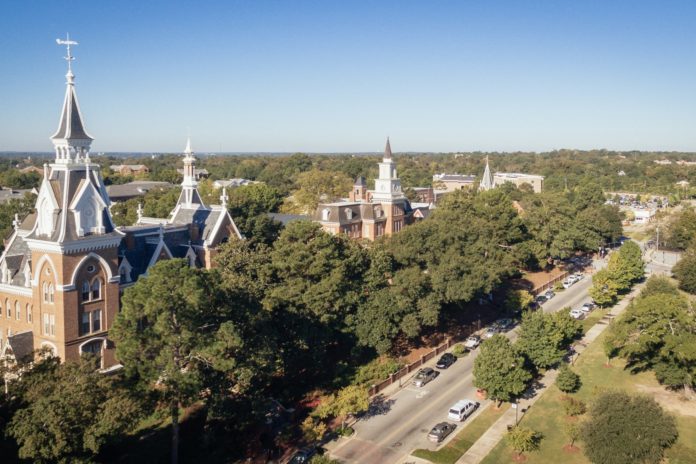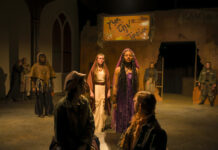U. S. District Court Judge Beverly B. Martin was the commencement speaker at the Walter F. George School of Law commencement on May 6, which was held at the Macon City Auditorium. Below is her commencement address:
President Godsey, Dr. Fleming, Dean Floyd, distinguished members of the faculty, and members of the graduating class of 2005:
It is a real privilege for me to be here in my hometown with you on this marvelous day. I love Macon, and I have a tremendous affection for Mercer Law School. My great grandfather, my grandfather, and my father each graduated from the Mercer School of Law, and if I have accomplished anything in this profession, I know that it is due, in large part, to the heritage given to me by these three Mercer lawyers.
I am here to honor the graduates, but this is a big day for the families of the graduates as well. There are many mothers, fathers, husbands and wives who have sacrificed so much to make this day possible. I want to be sure you understand what a tremendous gift you have given to your graduates by helping them become lawyers. In my own life it is certainly true that I have had opportunities which I never could have imagined, and which would never have happened to me, except for the fact that I am a lawyer. I have gone places, met people, and lived a life full of rich experiences which simply would not have been available to me if I were not a lawyer. I have had those opportunities, in part, because my family was generous enough to help me become a lawyer. Likewise, you have given your graduates a gift which will remain with them from now on – the gift of being a lawyer.
To the graduates, I want to talk with you a moment about the opportunities that I believe await you in this profession. At my own graduation, I really was just happy to be there. I had no idea the possibilities that this profession held for me. There are many possibilities for you because this is a time that many, if not all, of the institutions that constitute this great country of ours are facing very demanding problems.
You see it everywhere. Our corporations, our law firms, our military, our churches, and our government (local, state and federal) all face very demanding problems, which can only be solved through LEADERSHIP. Whether you realize it today, it is true that the three years you have spent here have given you the tools that you need to provide that leadership – in any area you choose. You are equipped to take on those opportunities, and it is a good thing, because we need your leadership.
As you step forward to assume these leadership roles, today is a good day to reflect on other lawyers who have been called upon to lead our country in hard times.
Perhaps the most obvious example is our 16th President – Abraham Lincoln. He grew up in very, very modest circumstances, in which an education and even books were luxuries. I read that his mother, who died when he was nine years old, never learned to read. But he had a burning desire to be an educated person, and he knew from a very early age that he wanted to be a lawyer. One story has it that when he was 17 years old, he walked 17 miles to the courthouse just to watch lawyers trying cases.
President Lincoln was inaugurated in March of 1861. It was truly one of the darkest hours of our nation’s history. At the time of his inauguration, seven states had already seceded from the Union. Five weeks later, the Civil War began. The country was in real danger of being divided into two nations, and President Lincoln wanted desperately to hold the Union together. He called upon his skills as a lawyer to do so. He paraphrased from the Bible: “A house divided against itself cannot stand.” Mark 3:24-25. Through his leadership, and his personal skills (learned no doubt in his training as a lawyer), our country survived.
Even on this day so full of possibilities, I think we have to accept that all of you cannot be president of the United States. But that is alright, because lawyers have offered leadership in all areas. Five years after President Lincoln took his oath as president, a young man was born the 6th of 7 children in Milville, Ohio. He was named Kenesaw Mountain Landis.
As Kenesaw Mountain Landis grew up, baseball was in the process of becoming the great American past time. However, in what is still regarded as the most infamous episode in the game’s history, it came to light that in the 1919 World Series between the Cincinnati Reds and the Chicago White Sox, eight members of the White Sox were said to have taken bribes from gamblers to intentionally lose the series. This was a terrible scandal for baseball, and for our country. Many thinkers of that time discussed what was needed to set this situation straight.
A report went out which called for a man “of unquestionable reputation and standing in fields other than baseball.” They wanted someone “whose mere presence would assure that public interests would first be served, and that therefore, as a natural sequence, all existing evils would disappear.” They turned to a lawyer.
Baseball appointed Kenesaw Mountain Landis as its first Commissioner. By that time, Kenesaw Mountain Landis was Judge Landis. President Theodore Roosevelt had appointed Judge Landis to the United States District Court for the Northern District of Illinois. When Judge Landis got the call, he accepted, but he did not quit his day job. He continued to serve as a district court judge, and also assumed the post of Commissioner of Baseball. He served with great distinction, and ruled with an iron fist. He suspended Babe Ruth for 40 games for “barnstorming” after the 1921 World Series. He is widely perceived as having restored integrity to baseball, and he certainly saw it through the crisis.
I would be remiss if I did not also mention our local hero, William Augustus Bootle. Judge Bootle was a very well-regarded lawyer here in Macon, with so many ties to Mercer. He even served as interim dean of Mercer Law School. President Eisenhower appointed him to the bench in 1954, which was a very tumultuous time for our country. That was the same year that the United States Supreme Court decided Brown v. the Board of Education. There was much public turmoil about this case, but Judge Bootle in his role as a man of the law, implemented the decision of the Supreme Court. He did so despite tremendous public criticism and even threats made against him.
I do believe that there are untold opportunities that await you as lawyers. But there are things that you can do, and must do, in order be available when those opportunities present themselves. You know that you were chosen to come to this school because you are smart, and you had an outstanding record. I would submit that you are also here because the Admissions Office saw indications that you have the character to be a leader.
As a lawyer, you will come into contact with people who are under stress and facing problems unlike anything they have ever faced before, and which may seem insurmountable to them. That is why they come to you. There are so many examples of this, but I want to tell you about one which I recently observed in my courtroom.
I was assigned a simple automobile accident case, which is unusual for me, but it came to my court on diversity jurisdiction. It involved a gentleman from Cleveland, Tennessee. He had been in Atlanta to bury is wife’s mother. He was distracted because he was following an elderly relative who had taken a wrong turn. He pulled out in front of an oncoming car, and caused an accident. The case was in my court not because he denied fault , but because he had limited insurance coverage, and the woman who ran into him, had, over the years incurred medical expenses in the amount of about four times the amount of his coverage. The insurance company believed that the medical expenses were either unnecessary or unrelated to the accident.
Now the lawyer hired by his insurance company was very good, and therefore very busy. He had lots of cases to try. Still, he took the time to talk to this gentleman from Tennessee, and understand that he was terrified, particularly about the financial implications of the case. He understood that depending on what the jury did, he had the potential to lose his house, and really everything he had worked for. He was even worried about the cost of staying in a hotel in Atlanta during the trial. This very busy and very talented lawyer understood this, and in an act of tremendous compassion and generosity, took this gentleman into his home during the trial, to save him the money a hotel would have cost.
Now the jury saw the case the same way that the insurance company did, and returned a verdict which was completely covered by the insurance. So this gentleman went back to Tennessee knowing that he had been well represented by a good lawyer, but probably thinking that lawyers are not so bad after all. I promise you, there will be a hundred ways, at any given time in your practice to show this type of kindness for someone experiencing a time of need. One of my wishes for you is that you recognize these opportunities, and that you take them. Our profession will be better for it, and your life will be more meaningful as well.
Also, in urging you to stay in touch with the traits of decency which got you here, I would urge you not to lose sight of the importance of telling the truth. Many of you will be practicing at law firms. I know that you understand that with that comes certain billable hour requirements. What may surprise you is how much competition there is for clients who will pay you for working those hours that your law firm expects you to bill. I say to you with a heavy heart, that I have come to believe that there are clients who will come to you, and say, if you are not willing to hide this fact about my case, or if you are not willing to lie about the facts of my case, I am going to take my business elsewhere. I implore you to let them go. My observation is that the lawyers who have succumbed to this type of pressure either get in trouble, and don’t practice long, or they survive, but they hate what they do, and they don’t respect themselves, so they don’t respect the profession.
I am going to conclude now, by thanking you again for the honor of being with you today. When Dean Floyd called me to ask me to be here today, I was so thrilled, as were my friends and family. One of my loved ones said, “Gosh, that is really a compliment. Mercer Law School could have gotten somebody really good as their commencement speaker.” I recognize that, and I would like to tell you that if I deprived you from having a celebrity, I am sorry. However, I can’t imagine anyone could have higher hopes for you, or more wishes for your success than I share with you today.
Please go forth from this place, do well, and in the process continue the wonderful heritage that has been given to us in this profession.









